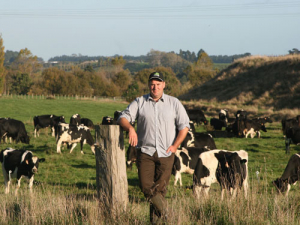The dramatic spread of cow disease Mycoplasma bovis has alarmed farmers, says Federated Farmers vice-president Andrew Hoggard.
Farmers are hugely concerned the disease has spread beyond South Canterbury, Hoggard says.
“The more widespread the disease gets, the harder it will be to control,” he told Rural News.
Last week, the Ministry of Primary Industries revealed that four more farms, including one in the North Island, have tested positive for the disease. Another property is strongly suspected to have the disease too.
One of the recently infected properties is in the Hastings district, the other three are within a farming enterprise in Winton. The suspect property is near Ashburton.
MPI’s director of response Geoff Gwyn says early indications are that all the properties have links with the Van Leeuwen Dairy Group (VLDG) through cattle movements.
“The Hastings and Ashburton properties were identified through our tracing programme and the Winton property was identified through the industry milk testing programme.
“All the movements we have been tracing are prior to July 21 when the disease was first detected and notified to MPI.”
The Hastings and Winton properties are now under a Restricted Place Notice under the Biosecurity Act, effectively placing them in quarantine lockdown -- restricting the movement of animals and other risk goods on and off the farm.
The suspect property is under voluntary movement control.
Hoggard says it was too early to say whether poor record keeping by farmers is to blame for the delay in identifying affected farms. But he thinks there may be some lessons for NAIT.
“My gut feeling is this will lead to some improvements to NAIT systems,” he says.
Gwyn says MPI is dealing with a lot of uncertainty.
“Our investigators are building a picture of stock movements onto and off these farms so we will not be making hasty decisions on next steps.
“While it’s really disappointing to have these new properties, it is not totally unexpected. We know this disease is spread by contact between animals and the movement of stock, as is the case here.
“It was always possible further infected properties would be found; buying, selling and moving stock is a common practice in farming. A key part of our response has been identifying and investigating animals that have moved to or from affected properties before Mycoplasma bovis was first detected. This tracing is complex detective work which takes time.
“I know an obvious question people will have is ‘Why has it taken this long to find these properties?’ The answer to that lies with the nature of this particular bacteria.
“It is a tricky thing to find and often hides within an animal, lying dormant and not revealing itself for weeks or months.
“Some cattle may be infected and never show signs of the disease. This is why we test multiple times using multiple kinds of tests. Sometimes to confirm the disease we have to test organ tissue from animals at slaughter as was the case in Hastings.”











